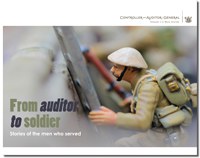Robert Maxwell Sunley
Robert Maxwell Sunley from Wellington joined the Audit Department as a Cadet in September 1903. He passed the Senior Civil Service Examination with distinction in 1906. He also studied accountancy at Victoria University College and qualified to be a member of the New Zealand Society of Accountants in 1909. Robert attained the position of Book-Keeper, Class VI, in 1913.
Robert married Marjorie Monaghan in January 1916, when he was 30 years old. He was called up for military service in November 1916, a year after his younger brother, Harold, had enlisted. The Auditor-General appealed the conscription on the grounds of public interest and, at the appeal hearing in January 1917, told the Military Service Board that:
Mr Sunley held an important position; he dealt with the issue of loans and other matters of public debt. For this work, special qualifications and knowledge of certain statutes are needed. Sunley was now dealing with the recent 10 million pound War Loan and which comprised 28,000 debentures, all of which he had to check.
The Auditor-General said that 22 of his staff of 50 had volunteered for military service, and it had been difficult to find someone who could take over this work. A new person was being trained, but it would take 4-5 months before he could replace Robert. The Auditor-General therefore sought an extension of several months to Robert’s call-up date.
The Board’s decision was that leave of absence be secured for Robert until 30 April. However, he did not enter camp until 13 June 1917. He was promoted to Corporal the next day and, in September 1917, to Sergeant. Three months later, at his own request, he reverted to his previous rank.
Robert embarked in April 1918 with the 36th Reinforcements, 3rd Reserve Battalion, Wellington Regiment, and, in mid-July 1918 was based at Sling Camp in England. While there, Robert became unwell. He was assessed by a Medical Board on 20 October 1918 and was diagnosed with goitre. The Medical Officer recommended discharge to New Zealand, and the Board recommended that Robert be discharged as “permanently unfit for general service”.
Robert left Sling Camp in late November 1918, embarked for New Zealand in early January 1919, and was discharged from the New Zealand Expeditionary Force on 21 March 1919. He was awarded the British War Medal in 1921.
Robert rejoined the Audit Department in March 1919 as Principal Book-Keeper, Class V, and by 1922 was the Officer in Charge of the Loans Audit Section, Class III.
Robert was involved in Audit Department sporting and social events before and after his military service. He played in a department rugby team, took part in swimming and athletic sports before WWI, and attended post-war Audit Department dances with his wife.
Robert was appointed Officer in Charge, Control Branch in 1932, and in May 1933 was appointed as the Department’s representative on an inter-departmental committee on the decimal system. In 1936, he transferred to the Treasury as Acting Assistant Accountant, and was subsequently appointed for a four-year term as Finance Officer at the New Zealand High Commission in London.
Robert, Marjorie, their 19-year-old son, Hugh, and 12-year-old daughter, Barbara, sailed for the United Kingdom in April 1936.
In February 1939, Robert was appointed by the Treasury to the position of Assistant Accountant. He was to take up the position when his term in London ended. However, according to his family, the High Commission staff stayed put when war broke out.
Robert apparently continued working at the High Commission in London after his original four-year appointment. Robert represented the High Commissioner at a number of events, including the New Zealand Anti-Tank Battery dance and concert in early 1940 (his son, Hugh, enlisted at Aldershot in October 1939 and was a member of that unit). On more than one occasion, Robert was also briefly Acting High Commissioner in February 1946 when Bill Jordan was on leave.
An August 1945 press statement by the Prime Minister on the reappointment of Bill Jordan as High Commissioner in London said:
The war years have been for Mr Jordan as for other members of the High Commissioner’s staff ... a period of great stress and strain. As a result of the long periods of bombing, life was a nerve-wracking and a hazardous business.
This would have been compounded for Robert by his son being reported missing in Crete in 1941, later a prisoner of war, and by the death in 1943 of his then 18-year-old daughter from osteomyelitis. She could not be treated with penicillin because it was in short supply – penicillin was generally being given to the troops.
Both Robert and Marjorie were involved in voluntary work during WWII, on committees and working parties formed to assist New Zealand forces overseas.
After Robert retired in 1948, he and Marjorie came to New Zealand to visit their families. They returned to live in London, where their son, daughter-in-law, Marion, and grandchildren also lived. Marion, now in her mid-eighties, remembers Robert as a “kind and gentle father-in-law and grandfather to our children, Peter and Helen”. Robert died in 1959, aged 74 years, and Marjorie died in 1981.
During his lifetime, Robert also served his church. He taught Sunday School as a young man, was a lay reader, and was a vestryman for more than 20 years. He was honorary auditor for several community organisations in Karori, where he lived before moving to London.

